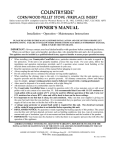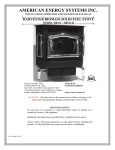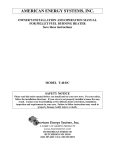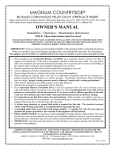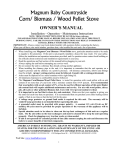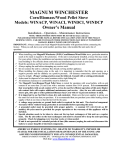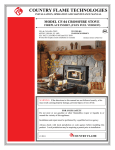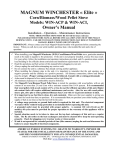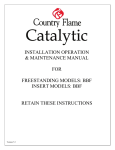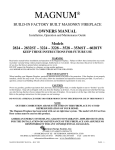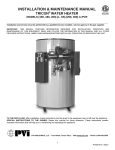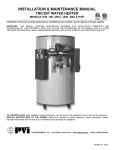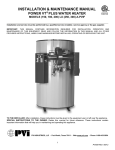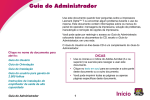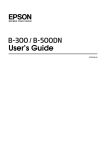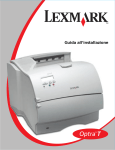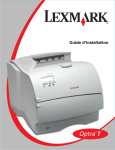Download American Energy Systems Avent Owner`s manual
Transcript
Avent WOOD PELLET STOVE OWNER’S MANUAL Installation – Operation – Maintenance Instructions NOTE: THESE INSTRUCTIONS MUST BE SAVED for future reference HOT WHILE IN OPERATION -KEEP CHILDREN, CLOTHING AND FURNITURE AWAY - CONTACT MAY CAUSE SKIN BURNSPLEASE READ THIS ENTIRE MANUAL BEFORE INSTALLATION AND USE OF THIS PELLET BURNING STOVE. FAILURE TO FOLLOW THESE INSTRUCTIONS MAY RESULT IN PROPERTY DAMAGE, BODILY INJURY OR EVEN DEATH. IMPORTANT: Always contact your local dealer/installer with questions before contacting the factory. When you call have your serial number, purchase date, who installed the unit and a list of questions. 9 When installing your Avent Wood Pellet stove, particular attention needs to be made in regards to fire protection. If the unit is not properly installed, a house fire may result. For your safety, follow the installation and operation instructions provided. Contact local building or fire officials about restrictions and installation inspection requirements in your area. 9 Read the operations and fuel section of this manual before plugging in your unit. 9 Always unplug the unit before attempting any service work. 9 Do not connect the unit to a chimney flue already serving another appliance. 9 When installing the chimney pipe to the unit, it is important to remember that the unit operates on a positive pressure and the chimney on a positive pressure. All chimney connections, elbows and fittings must be airtight. (proper venting practices must be followed. Consult with a venting professional) 9 Ashes must be disposed of in a metal container with a tight fitting lid. 9 All minimum clearances to combustibles must be followed. 9 The Avent Wood Pellet Stove is tested for operation with wood pellets with ash content of no more than 2%. It is recommended that wood pellets with an ash content of 1% or less be used for efficient operation of this unit. For use with wood pellets, cherry pits, olive pits or other pelletized fuel. 9 It is important to use fuel that is clean, dry and consistent. Make sure that your supplier is giving you the same fuel each time that you purchase. It is recommended that you purchase your entire heating season supply of fuel at one time so that the fuel will be the same. 9 A voltage surge protector or ground fault outlet is required for this unit. The warranty will be voided if surge protection is not installed before operating this unit. 9 A grounded outlet must be provided with proper polarity. A constant 115 volt, 60 cycles must be provided for proper operation or the warranty of this appliance will be forfeited. 9 Special attention needs to be taken to clean out the top heat exchangers of this unit on a regular basis. The fly ash from the venting settles on the top heat exchangers and must be cleaned off to keep the unit operating properly. Check for plugging every one-two weeks or when needed. 9 If unit is not operated for extended periods of time (like summer) unplug the unit and disconnect the battery to assure long life of electrical components. 9 This appliance has been tested to ASTM E1509 ULC C1482standards by OMNI-Test Laboratories, Inc. 9 The authority having jurisdiction (such as municipal building dept., fire dept., fire prevention bureau, etc.) should be consulted before installation to determine the need to obtain a permit. 9 If smoke detectors are installed close to the appliance, they may go off if the stove door is left open or if there is not adequate fresh air for the appliance to operate properly. AMERICAN ENERGY SYSTEMS, INC. GRANTS NO WARRANTY, IMPLIED OR STATED, FOR THE INSTALLATION OR MAINTENANCE OF THE STOVE AND ASSUMES NO RESPONSIBILITY FOR ANY CONSEQUENTIAL DAMAGE(S). AMERICAN ENERGY SYSTEMS, INC. -150 Michigan Street SE - HUTCHINSON, MINNESOTA 55350 Web Site: www.hearthdirect.com Rev. date 05/05/04 TABLE OF CONTENTS PAGE TECHNICAL BULLETIN: IMPORTANCE OF FRESH AIR 3 AVENT TECHNICAL DATA / ESTIMATED FUEL FEED RATE CHART………………. 4 INTRODUCTION & SPECIFICATIONS………….……………………………………….... 5 SAFETY STEPS ……………………………………………………………………………... 6 BURNING SOLID FUELS (WOOD PELLETS)………………………................................... 7 UNPACKING YOUR AVENT WOOD PELLET STOVE / FLOOR PROTECTION / CLEARANCES TO COMBUSTIBLES……………………………………………………… GUIDELINES FOR EXHAUST VENTING SYSTEMS DESIGN……………..………......... 8 9-11 DESIGN GUIDELINES FOR OUTSIDE COMBUSTION AIR CONNECTION………….... 12-13 INSTALLATION CONFIGURATIONS / MOBILE HOME INSTALLATION REQ………. 14 ALCOVE / FREE STANDING STOVE INSTALLATION REQUIREMENTS…………….. 15-17 GLASS MAINTENANCE, ADJUSTMENT, REMOVAL AND REPLACEMENT………… 17 CLEANING THE GLASS / STOVE CONTROLS…………………………………………… 18-19 PRIMING / LIGHTING / OPERATING INSTRUCTIONS………………………………….. 20 CIRCUIT BOARD FUNCTIONS / SETTING THE DRAFT………………………………… 21 MAINTENANCE INSTRUCTIONS…………………………………………………………. 22 SPECIAL CLEANING / OPERATIONAL INSTRUCTIONS……………………………….. 23 AUTOMATIC SAFETY FEATURES………………………………………………………... 24 THERMOSTAT INSTALLATION / OPTIONS……………………………………………... 25-26 12 VOLT DC WIRING INSTALLATION…………………………………………………… 27 TROUBLE SHOOTING GUIDE……………………………………………………………... 27-29 REPLACEMENT PARTS LIST……………………………………………………………… 29 WIRING DIAGRAM / CIRCUIT BOARD FINE TUNE ADJUSTMENTS…………………. 30 WARRANTY INFORMATION……………………………………………………………… 31 SERVICE RECORD………………………………………………………………………….. 32 WARRANTY REGISTRATION CARD……(IN HARDWARE PACKET) 2 Technical Bulletin Importance of adequate fresh air Every home is a slightly different situation and depending on the design of the air movement within the home, might be easy to distribute heat or very difficult. If you have boiler heat or other non-ducted central heating this becomes even more of a challenge as adequate circulation within the home and proper make up air for combustion is lacking because of the design of your central heating system. When a forced-air system is put into a home that is not designed with proper circulatory patterns, it might be necessary to add return air ducts or at least vents to get the air moving around the home. Fresh air for the home and fresh air for combustion will have to be added or the stove or furnace will burn dirty and efficiency will suffer. Your dealer needs to assess the fresh air requirements for the home. At a minimum, there should be a 6” or larger (this should be determined by figuring what the home requires) fresh air vent coming in to a neutral part of the home to make sure that there is adequate fresh air to the home. Then the 3”make up air to the unit is required to be provided. If the wood pellets are not burning correctly you need to address a few things. Are the wood pellets wet or dirty? If they are, make sure that your wood pellets are cleaned (we have an excellent “E-SIFTER” product that will do a great job) and below 15 percent moisture. 3-4 percent moisture is ideal. The most common cause of wood pellets not burning properly is contaminated air or negative pressure in the home. It can be as simple as the air adjustment not set properly on the side of the stove or it could be that there is a serious lacking of good quality air in the home caused by negative pressure. If you have done any remodeling or if this is a newer home, it is a very real possibility that this is happening. Most basements have negative pressure even if you feel that your home is drafty. This is called the stack or chimney effect. Excessive positive pressure in the home can also cause problems such as over firing. If there is a black coating of soot coming into the home it is caused by the reversal of the exhaust that would normally exit the stove outside being drawn into the home by negative pressure or improperly installed venting. Depending on your venting configuration this could be aggravated by back drafts, high wind and cold chimneys. Sometimes this also occurs if there is an intake for fresh air too close to the exhaust on the outside of the home or other conditions causing the exhaust to be pulled back into the home. The first indications of negative pressure affecting the stove occurs app. 3 days after the stove is lit. The glass gets dirty very easy, the firepot might keep filling up even though you pull the air adjustment out, and you notice that the venting fills up with soot rapidly. After a few days, the exhaust can no longer adequately pull out all of the fly ash so it reverses and is pulled into the home. This might happen through the venting if it is not sealed properly or it might come out when you open the door for maintenance and also backwards through the air wash system. This can be easily corrected by adding the fresh air for the home and also for the appliance. It is imperative that you would have your dealer or installer check the unit out for proper operation to make sure that there is nothing mechanical wrong with the appliance and then determine your need for proper fresh air. Your dealer can contact the factory with any questions that he might have. 3 AVENT TECHNICAL DATA ESTIMATED FUEL FEED RATE CHART The fuel feed rates shown can vary as much as 30-50% depending on fuel quality. WOOD PELLETS: Fuel consumption will vary depending on fuel size Low fuel setting Medium fuel setting High 16 ounces per hour 24 ounces per hour 38 ounces per hour 2.5 ounces in a 10 minute test 4 ounces in a 10 minute test 6.4 ounces in a 10 minute test These fuel consumption feed rates are an approximation. Each unit will vary with the type and size of the fuel that is being burnt. The most important feed rates to check would be the # 1 setting and the High setting to make sure that the low and high feeds are proper for the unit. If the feed rates are drastically different contact your local dealer for circuit board factory adjustments. Do not get alarmed if the feed rates are not the same as shown. As long as the low fire will stay lit and the high fire does not overheat the unit and shut it down the unit is performing as it should. The unit is designed to adapt to different size fuels and consumption circumstances. If you are experiencing different feed rates than shown you will need to set the fuel feed rate on a lower or higher setting to adjust for the differences in the fuel feed rate. The size and flow characteristics of wood pellets vary from year to year and that alone will change the heat output of the unit. There is a fine tune adjustment that the Reseller can make to the circuit board if the low fire will not stay lit or is burning too hot. You will need to contact your local Reseller for this adjustment. It is recommended that when the unit is first installed in the customer’s home that the unit be fired and run for over an hour to see if the air adjustment is right for the fuel. Making the proper air adjustment and making sure that proper outside air has been provided will allow the unit to perform properly. The Avent is certified to burn premium quality wood pellets. Check with your local Reseller before burning fuels not approved. NOTE: The factory will not pay warranty service calls on problems that have come up on the unit when the proper fuel, combustion air requirements and air adjustments have not been checked. tdocbeff DEAR VALUED AVENT OWNER, We appreciate your decision to help preserve our precious environment by purchasing the Avent Positive Draft Wood Pellet Appliance. With everyone working together, we can have clean air and renewable heat for our homes. Please read this Owners Manual carefully before using this appliance and if you have any questions contact your local Avent reseller. We appreciate your business and wish you many warm days and nights with your new Avent Wood Pellet Appliance. Sincerely, Mike Mike Haefner, President American Energy Systems, Inc. P.S. You are very important to the success of our business and your referral of our products is very much appreciated. Many of our Resellers have referral rewards available and I encourage you to ask your local dealer how to get involved in helping make our country energy self-sufficient. GOOD LUCK ! SPECIFICATIONS American Energy Systems, Inc., manufacturer of the Avent Wood Pellet Appliances, reserves the right to alter its products, their specifications and/or price without notice. Safety tested and EPA exemption tested by OMNI-Test Laboratories, Inc. to ASTM1509, ULC C1482. Heat Output* 20,500 BTU/HR Fuel Storage Capacity 20 Lbs. Width 15.5” Height with Pedestal 28” Depth 28” CLEARANCE TO COMBUSTIBLES Back Wall Vertical Termination w/ 3” Pellet Vent 4” (100mm) Side 4” (100mm) Corner 3” (75mm) Flue to Wall 3” (75mm) Floor Prot. 6” (150mm) out in front of unit 0” to sides BTU output will vary, depending on the brand of fuel, size of fuel, quality of fuel and moisture content. Consult your authorized Avent reseller for information on the best fuel to use to get the best results. 5 SAFETY STEPS IMPORTANT: Proper installation of this stove is crucial for proper and safe operation. Installing this product improperly may result in a house fire and personal injury. All applicable building codes for your location must be followed. In areas where building codes require additional steps to the installation of this product not included in this manual, the building codes will take precedent and must be followed. Contact your local building inspector to obtain any necessary permits or inspection guidelines before installing the product. (This appliance must be installed by a trained professional installer to assure proper installation and warranty of this product) Warranty Labor and shipping will not be covered if the unit is not installed by a trained installer. 9 DISCONNECT THE POWER CORD BEFORE SERVICING THIS STOVE! A power surge protector is required. The unit must be plugged in to a grounded 110 -volt 60 hz or a 12V DC sealed Battery power source. NEVER use an “unsealed” type battery, nor operate unit on a battery without a 12 volt 4 ampere in-line fuse on a positive line. 9 Always route the power cord away from the unit. Do not route cord in foot traffic areas. Do not pinch cord under furniture. Do not add any additional length to the power cord. 9 This product requires simple periodic maintenance for proper operation and long life of the stove. Read and follow the maintenance schedule closely. 9 The Avent Pellet stove is designed, approved and tested to burn wood pellets. The burning of other solid fuels such as cord wood in this stove is not permitted. If you are burning fuels not approved for this appliance it will void the warranty and no service/warranty will be allowed. The Avent will burn high ash content fuels but will require additional maintenance/cleaning. 9 A working smoke detector must be installed in the same room as this product. 9 Flammable or explosive liquids such as gasoline, naphtha or engine oil must NEVER be used in or around this stove. These liquids must be stored well away from this stove as the open flame in the burner chamber could ignite the fumes of such liquids. Do not burn garbage in this unit. 9 According to HUD requirements, when installed in a mobile home, this stove must be grounded directly to the steel chassis of the mobile home and bolted to the floor. 9 This stove is not intended for use in commercial installations but can be used. 9 The moving parts of this stove are propelled by high torque electric motors. The auger can cause severe injury to body parts that may get near them. Keep all body parts away from the auger while the stove is plugged into an electrical outlet. These moving parts may begin moving at any time while the stove is plugged in. 9 This unit must be installed on a non-combustible surface. Make sure that the unit is level. 9 Do not attempt internal service to the unit when it is burning and or plugged into power. 9 It is a good idea to burn the unit outside for a couple hours before installation to burn off any paint or oil fumes. (most resellers pre-burn the unit before you receive them, do not worry if your unit has looks like it has been burnt) IMPORTANT: It is the customer’s responsibility to make sure the Reliant Appliance is installed with the proper make up air system and the home is checked for adequate fresh air so that the appliance does not become the fresh air source for the home. 6 BURNING SOLID FUELS (wood pellets) Unlike petroleum and natural gas products, solid fuels such as wood pellets create ash as the fuel is burned. Even with the highly efficient flame your Avent Wood Pellet stove will produce, the solid fuels used will produce ash. This ash will have to be cleaned out of the stove from time to time. The cleaning procedure will be discussed later in this manual. You can minimize the amount of cleaning required and maximize the efficiency of your stove by maintaining the correct draft settings. The draft setting on your stove may have to be changed from time to time to accommodate your specific burning conditions. Proper draft setting will be discussed later in this manual. The point we wish to make here is that your Avent Wood Pellet stove, due to the nature of solid fuels, will require brief periodic attention. Please do not expect to light your stove and walk away from it until you want to shut it off in the spring. A few moments of adjustment and cleaning from time to time is an important part of burning solid fuels. The Avent Wood Pellet stove has been designed to burn wood pellets that meet the Association of Pellet Fuel Industries standards. Since these fuels vary greatly in quality and consistency, AES cannot be responsible for damage done to your stove due to fuel problems. The following are guidelines to using and selecting proper fuels for your stove. WOOD PELLETS 9 Be consistent in your wood pellet fuel supplier. Wood Pellets will vary in content and burn characteristics from supplier to supplier. A consistent supply of wood pellets will require fewer adjustments to the draft of the stove. 9 Check your wood pellets for foreign objects. Your stove warranty will not cover damage done to your stove due to foreign objects in the fuel supply. 9 Store your wood pellets in a dry place to prevent them from absorbing excess moisture. 9 Vacuum the hopper out after every 6-7 bags to eliminate buildup of sawdust. More often if the wood pellets are poor quality. If sawdust is a problem you will have to screen each bag of fuel for a consistent feed. 9 Wood Pellets vary from supplier to supplier in ash content from less than 1% to 3% or more. Low ash content pellets will allow you to burn the stove longer between cleanings. Only wood pellets manufactured to the Association of Pellet Fuel Industries (A.P.F.I.) standard for residential pellet fuels are recommended. Look for A.P.F.I. registration number on the back of pellets. Consult your local Avent Wood Pellet reseller for more information on approved wood pellet fuel. 9 Do not place or store any fuel within the space heater installation clearances or within the space required for filling the fuel hopper and ash removal. It is strongly recommended not to keep a supply of wood pellets over the summer months. Moisture will build up and cause problems in the fall with your appliance operation. Make sure that your supplier is not selling you left over fuel or fuel that has been out in the rain. 7 UNPACKING YOUR AVENT WOOD PELLET STOVE When you receive your Avent Wood Pellet Stove be careful to inspect all parts and components to make sure that nothing was damaged or lost in shipment. If there was shipping damage, be sure to report it to your Avent Wood Pellet reseller, or the shipping company that delivered your unit. Freight damage claims must be made to the Freight Company immediately. If parts are missing contact your local Avent Wood Pellet reseller or contact the factory right away. Your satisfaction is our top priority. To uncrate your Avent Wood Pellet Stove: 1) Cut the banding straps and open the carton lid. The carton is stapled to the wood pallet so it will be necessary to pull the cardboard loose from the pallet. Remove the crating box carefully lifting up over the top of the unit. Be careful not to scratch the unit with the staples. Remove the wood blocks and plastic. We strongly urge you to recycle the packaging materials to help protect the environment. FLOOR PROTECTION The Avent Wood Pellet Freestanding Stove may be installed on a combustible floor, with proper floor protection, or on a masonry hearth. The hearth or non-combustible floor protector must extend a minimum of (6) six inches (152mm) in front of the unit and beyond each side of the fuel loading and ash Removal openings. CLEARANCES TO COMBUSTIBLES The stove must be installed with the following minimum clearances to side and back wall combustible materials. NOTE: These are minimum clearances to combustible walls established by the testing lab. The amount of room needed on the left side of the unit to access the electrical panel is (6) six inches. D C E A=4” B=4” C=4” D=3” E=8.5” A= Left D B= Right Residential/Mobile Home Horizontal + Vertical Corner Installation Residential/ Mobile Home Vertical Installation 8 The side and top clearance are to be used when installing the Avent Wood Pellet stove into an alcove as shown to the left and below. Minimum Alcove Height is 56” (1425mm) Maximum Alcove Depth is 36” (915mm) 28” Minimum Alcove width is 27.5” (700mm) 14” 28” 6” min. HEARTH PROTECTION GUIDELINES FOR EXHAUST VENTING SYSTEMS DESIGN It is recommended that only an authorized Avent Wood Pellet installer install your wood pellet stove. The following installation guidelines must be followed to ensure conformity with both the safety listing of this stove and to local building codes. 9 A listed 3” or 4” type “PL” pellet vent exhaust system must be used for FREESTANDING installation and attached to the pipe connector provided on the top of the stove. Use a 3” to 4” adapter for 4” pipe. A cap must be used at the termination of type “L” vent chimneys. Existing approved 4, 6 and 8” wood stove pipe may be used with adaptors to 3 inch pellet vent pipe as shown in the installation instructions. The pipe adaptors must be provided by the venting manufacturer. 9 Do not terminate vent in any enclosed or semi-enclosed area, such as; carports, garage, attic, crawl space, under a sundeck or porch, narrow walkway or closed area, or any location that can build up a concentration of fumes such as a stairwell, covered breezeway etc. 9 Vent surfaces can get hot enough to cause burns if touched by children. Non-combustible shielding or guards may be required. DO NOT INSTALL A FLUE DAMPER IN THE EXHAUST VENT OF THIS UNIT. 9 Termination must exhaust above air inlet elevation. It is required that at least 5 ft. of vertical pipe be installed when the appliance is vented directly through a wall or in a basement. This will create some natural draft to prevent the possibility of smoke or odor during appliance shutdown and to keep exhaust from causing a nuisance or hazard from exposing people or shrubs to high temperatures. In any case, the safest and preferred venting method is to extend the vent through the roof. DO NOT CONNECT THIS UNIT TO A CHIMNEY FLUE SERVING ANOTHER APPLIANCE. 9 9 Distance from doors and windows, gravity or ventilation air inlet into building: Not less that 4 ft. / 1.2 m below, 4 ft. / 1.2 m horizontally from, 1 ft. / 305 mm above (This does not apply if the Windows are non-opening or have been fixed so they cannot open.) 9 Distance from bottom of termination and grade – 1 ft. / 305 mm minimum. This is conditional upon the plants and nature of grade surface. The exhaust gases are not hot enough to ignite grass, plants or shrubs located in the vicinity of the termination. The grade surface must not be a lawn. Distance from bottom of termination and public walkway is 7ft. /2.1m minimum. 9 Distance to combustible materials – 2 ft. / 610 mm. This includes adjacent building, fences, protruding parts of the structure, roof overhang, plants and shrubs, etc. 9 It is recommended that a single or double clean-out “tee”, for cleaning the vent in both directions, be installed at every 900 junction to enable collection of fly ash and to permit periodic cleaning of the exhaust system. 900 elbows accumulate fly ash and soot thereby reducing exhaust flow and performance of the stove. 9 Total length of horizontal vent must not exceed 36” (3 ft.) / 915 mm. All joints in the vent system must be fastened by at least 3 screws, and all joints must be sealed with RTV silicone sealer to be airtight. 9 When venting into an existing masonry or factory built chimney, the chimney must be cleaned, with all creosote removed. The chimney must be a type suited for solid fuel. WARNING: The chimney and the chimney connections must be kept clean and in good condition. 9 The “PL” vent or single wall stainless exhaust system must be installed so as to be GAS TIGHT! The vent manufacturer’s installation procedures must be followed. In addition, pipe connections, joints and all pipe seams within the home should be sealed with high temperature RTV silicone sealer. Single wall venting can only be used within the dwelling. 9 A minimum of 3 feet/915mm horizontally from the center line of any regulator/meter assembly 9 A minimum of 3 feet/915mm from any non mechanical air supply inlet to the building 9 A minimum of 6 feet/1830mm from any mechanical air supply inlet to the building NOTE: Local building codes or regulations may require different clearances. Special note for Canadian Installations: Where the venting may pass through a wall, or partition of combustible materials, the installation shall conform to CAN/CSA-B365. The wall thimble shall be properly sealed with Hi-Temperature silicone to prevent any moisture or vapor from building up. Make sure that there are no air leaks. Clearances to venting and also clearances to combustibles for the appliance can only be reduced by means approved by the regulatory authority. EXHAUST VENTING SYSTEM PRECAUTIONS: Soot and Flyash: Formation and need for removal- The products of combustion will contain small particles of flyash. The flyash will collect in the exhaust venting system and restrict the flow of the flue gases. Incomplete combustion, such as occurs during startup, shutdown, or incorrect operation of the room heater will lead to some soot formation which will collect in the exhaust venting system. The exhaust venting system should be inspected at least once every year to determine if cleaning is necessary. It is recommended to check the venting system monthly to assure proper operation of the appliance. 10 GUIDELINES FOR EXHAUST VENTING SYSTEMS DESIGN, CONT…… To determine whether a 3” or 4” exhaust system should be used, follow the guidelines below: 1) Determine the “equivalent pipe length” for each component used according to the comparison chart below. Add the “equivalent pipe length” of all components to get the “total equivalent pipe length”. 2) Determine the altitude at which you are installing the stove. 3) Cross-reference the “total equivalent pipe length” and the altitude using the graph below. NOTE: The “total equivalent pipe length” should not exceed 20 feet. Component Equivalent Length Horizontal Straight Pipe Actual Length in ft. x 1.0 Horizontal Pipe = 1 x (2+1) = 3 ft. Vertical Straight Pipe Actual Length in ft. x 0.5 Vertical Pipe = 0.5 x 8 = 4 ft. 5.0 feet 90 Degree Tee = 2x5= 10 ft. 3.0 feet 45 Degree Tee = 1x3= 3 ft. TOTAL = 0 90 Elbow or Tee 0 45 Elbow Equivalent Pipe Length 20 ft. NOTE: These are guidelines only. Proper venting is accomplished by design and common sense. In most installations 3 inch diameter venting is adequate. If it does not vent properly you will have to change it to 4”. CRITERIA FOR SELECTING PIPE DIAMETER MAXIMUM 25 20 4” DIAMETER ONLY 15 10 3” OR 4” DIAMETER 5 0 0 0 2 2 4 4 6 6 8 8 ALTITUDE X 1,000 FEET 11 10 10 12 12 DESIGN GUIDELINES FOR OUTSIDE COMBUSTION AIR CONNECTION OUTSIDE MAKE-UP AIR FOR COMBUSTION IS REQUIRED ON ALL INSTALLATIONS 1) For FREESTANDING installations with horizontal through-the-wall exhaust, it is REQUIRED that the stove combustion air intake be connected to a fresh air intake outside. If the home is newer or has been tightly insulated it is imperative to the operation of the unit to install outside combustion air. If you do not, then an additional 6 inch intake into the furnace room in the basement is required. 2) Connection to outside the house is REQUIRED for mobile home installations. 3” 3) The outside air tubing must be a minimum of 3” inside diameter. It is recommended that the tubing be non-combustible materials but is not required. 4) If the air inlet is connected to the outside, it MUST be terminated with a vertical 90-degree bend (down) or with a wind hood. Failure to do so could result in a burn back during high winds blowing directly up the air inlet during a simultaneous power failure (see diagram above). 5) It is important not to terminate the inlet of the fresh air intake too close to the venting outlet for the smoke. It is recommended that the inlet for the fresh air is a minimum of 3 feet away from the venting outlet and at least 1-2 feet below. 6) Blockage, excessive length, or bends in the air intake pipe will starve the stove of combustion air. A 90-degree bend is equivalent in restriction to approximately 30 inches of straight inlet pipe. 12 OUTSIDE AIR DIAGRAM Outside air hookup is located on the back panel of the pedestal fan housing. WARNING: DO NOT RESTRICT OR OTHERWISE COVER THE FAN INTAKE EXCEPT AS SHOWN FOR THE OUTSIDE AIR HOOKUP. The outside air must be directly connected to the appliance. Outside air may be taken from a vented crawl space. Outside air cannot be taken from an attic, garage or any other enclosed space within the building. 7/16” bolt to the steel chassis (only on mobile home installation) Note: The outside air tube will only cover a portion of the fan intake. Air will be drawn from outside and inside the home. Connect a flexible hose to the outside air adaptor plate and route the hose as directed in the diagram. WARNING: ROOM AIR STARVATION CAN CAUSE THE APPLIANCE TO MALFUNCTION, BURN DIRTY AND SHUT DOWN. IF YOU DO NOT INSTALL ADEQUATE FRESH AIR SUPPLY, RUNNING EXHAUST FANS, ICING UP OF CRACKS, ETC. WILL CAUSE THE UNIT TO NOT BURN PROPERLY. FRESH AIR IS REQUIRED FOR THIS APPIANCE TO OPERATE PROPERLY. 13 INSTALLATION CONFIGURATIONS The Avent Wood Pellet Stove may be installed as follows: 1) A freestanding unit (with a pedestal only) 2) A built-in heater mounted in an alcove with a pedestal MOBILE HOME INSTALLATION REQUIREMENTS IN ADDITION TO THE STANDARD INSTALLATION INSTRUCTION, THE FOLLOWING REQUIREMENTS ARE MANDATORY FOR INSTALLATION IN A MOBILE HOME: WARNING DO NOT INSTALL IN SLEEPING ROOM 1) 2) 3) 4) 5) Stove must be permanently bolted to the floor. Stove must have permanent outside air source. Stove must be permanently electrically ground to the steel chassis of the mobile home. All vertical chimney vent must have wall supports every (5) five feet. All exhaust systems must have a spark arrestor. CAUTION THE STRUCTURAL INTEGRITY OF THE MOBILE HOME FLOOR, WALL AND CEILING MUST BE MAINTAINED. CHECK WITH YOUR LOCAL BUILDING OFFICIAL AS OTHER CODES MAY APPLY. 7/16” bolt to the steel chassis 14 ALCOVE INSTALLATION REQUIREMENTS The Avent Wood Pellet is approved for the standard alcove height of 56 inches, or for a reduced alcove height with a minimum of 14 inches from the top of the stove (clearance for opening top lids). The maximum alcove depth is 36 inches and the listed side clearances are a minimum of 4 inch. The 14” 56” Minimum 4” minimum clearance is only needed for opening the back lid. The stove is approved for limited horizontal and vertical exhaust. It is required that the exhaust goes vertically for a minimum of 2 feet above the unit before a 90 degree elbow is installed and after the venting exits the home it must be terminated above the eave of the house. This will help draw smoke out of the stove in the event of a power failure. FREESTANDING STOVE INSTALLATION REQUIREMENTS (Limited) Horizontal Exhaust Termination: 1) Position stove on the noncombustible floor pad with the proper clearances to combustibles and in the location that you have determined will work. Place a Pipe Adaptor over the 3” starter pipe located on the top back of the stove and clamp into place using a 3” hose clamp. Note: It is not recommended to use silicone on this connection as it will have to be removed for cleaning and maintenance. 2) It is required that a minimum of 24” of vertical venting is installed before going horizontally. Horizontal venting cannot exceed 36” in length. Locate proper position for the type “PL” wall thimble and using a saber saw or key- hole saw to cut a 7 1/4-inch diameter hole through the wall for the 3-inch Type L Pellet venting. For a 4-inch pipe, cut an 8 1/4-inch hole. Install the appropriate wall thimble in the hole. Note:The size of hole opening will vary with brand of wall thimble. 15 3) NOTE: Make sure that you leave enough clearance between the wall and the back of the unit so that you will be able to install the outside air and work on the intake fan. 4) NOTE: In cold climates running the venting on the outside of the home without an insulated chase way will cause condensing, creosote buildup, staining of siding and poor operation of the unit. It is strongly recommended that all venting is run on the interior of the home and if that is not possible, install venting in an insulated chase way. 5) INSTALL VENTING AT CLEARANCES SPECIFIED BY THE VENTING MANUFACTURER. American Energy Systems does not assume responsibility for the venting design or installation of the product. Diagrams are shown as a reference and a guide for clearances. 90 degree elbow or clean out tee 5’ Minimum Height INSTALLATION INSTRUCTIONS: Conventional & Mobile Home NOTE: The following are general instructions for installing this appliance. The vent pipe manufacturer’s instructions should be followed for the brand of venting being used. • Before drilling or cutting holes, select the proper location of the appliance. • Determine location of combustibles, ceiling rafters, wall studs or floor joists before cutting holes. • Be careful not to drill or cut into any water or electrical lines as damage or injury may result. • Once the proper location and clearances are determined place the appliance on a non-combustible floor protector and line up the plumb bob with the hole in the ceiling or wall. • Cut the holes as required by the venting manufacture for proper clearance and location. • Outside make up combustion air is required. The duct may pass through the wall or floor to obtain fresh air from outdoors or from a vented crawl space. • Follow venting manufacturer’s requirements for sealing all joints with high temp silicone. • Secure venting to the flue collar on the stove with screws or the pipe adaptor. • It is recommended that the horizontal installation of the Type PL venting downslope ¼” toward the stove in a 12” run with a maximum length of 36”. 16 • STANDARD VERTICAL INSTALLATION The pipe lengths shown are for reference purposes only. Your actual pipe lengths and configurations will vary depending on installation requirements. Adaptors to 4”, 6” and 8” diameter approved listed venting systems may be used provided a minimum of 18” of 3” diameter Type L Pellet Vent is used as a starter section before making the connection. GLASS MAINTENANCE, ADJUSTMENT, REMOVAL AND REPLACEMENT Your Avent Wood Pellet Stove comes to you with the glass door installed in place, ready for use. The glass is surrounded on the edges with a gasket and seated in a glass channel. It is held in place with two (2) clips on the top and two (2) Clips on the bottom REMOVAL OF BROKEN OR DAMAGED GLASS Open the door and lift off of hinges. If the door is tight, tap gently on the bottom of the door with your hand or rubber hammer. Lay door down on newspaper with glass clips facing you. Using a #2 Phillips screwdriver, loosen the screws and take off the glass clips and bracket. Remove the broken glass carefully and discard. Check to make sure that the gasket material under the glass is in good shape. You can get this material from the factory or from an authorized Avent Wood Pellet reseller if it needs to be replaced. Reverse the above procedure for replacing new glass. When installing the new glass make sure that the glass is binding anywhere in the glass channel. The glass will break when tightening the screws if the glass is binding anywhere. WARNING DO NO OPERATE UNIT WITH BROKEN GLASS. DO NOT SUBSTITUTE ORIGINAL FACTORY GLASS. YOU MUST USE ONLY FACTORY AUTHORIZED GLASS: (HIGH TEMPERATURE CERAMIC GLASS, 5MM THICK 10” X 10”) DO NOT SLAM DOOR SHUT. DO NOT STRIKE GLASS. DO NOT USE ABRASIVE CLEANERS. DO NOT CLEAN WHEN GLASS IS HOT. 17 CLEANING THE GLASS When the fire is first started, it will produce some smoke. The smoke might accumulate on the glass surface. Before the fire gets hot, open the door and wipe the glass surface off with a damp rag. Do not touch the surface with your hands. If after constant use, the glass is dirty; you must clean the glass so that it will not become etched with the fly ash. When the glass has cooled off, take a damp rag, put a little fly ash from the unit on it and clean the glass. If this does not clean the glass use a special glass cleaner provided by your Avent Wood Pellet reseller. We have found that Amway crème glass & chrome cleaner works real well. GLASS CLIPS STOVE CONTROLS Manual Combustion air slide (pushing in the slide decreases the combustion air, pulling out increases the combustion air to the fire) 12 volt DC wiring installation The Avent pellet stove is designed to operate on a 12 volt DC battery system for extended back-up periods. This system may also be used in conjunction with 12 volt solar systems. WARNING: THE STRUCTURAL INTEGRITY OF THE HOME MUST BE MAINTAINED IF INSTALLING THIS SYSTEM. Disconnect 110 power source before connection of 12 volt dc battery. Determine proper length of 18 gage stranded wire to run from battery to unit. Back of unit 12V DC connections Room/Combustion air inlet Outside Air 3” dia. Hookup tube 110V AC power cord 18 Install ½” conduit if passing through a wall or floor. Connect Red 18 gauge stranded wire to red (+)terminal and Black 18 gauge stranded wire to black (-) terminal on back of stove. Pass wires through conduit leaving room for a drip loop between connections so that moisture will not get on connections. Install a 4 amp inline fuse on the red (+) lead near the battery. Connect the red (+) lead to the positive terminal and the black (-) lead to the negative terminal on the battery. Reconnect the 110 power source and the unit is ready to operate. The system will switch between 12 volt and 110 volt and charge the battery automatically. Diagram of heat exchanger cleaning/disassembly of top section The ash rake should not be left in the unit when operating. If you do, make sure that it is pushed all the way to the back of the unit and there is no buildup of fly-ash behind it. Diagram of Circuit Board Components Start Manual Feed Power .250 Terminal Spade (back of board) 1 2 3 Low- Med - Max Thermostat Jumper (factory Installed) back of board Low Voltage Thermostat hookup (back of board) 19 Feed Adj. L H Auger Light PRIMING / LIGHTING / OPERATING INSTRUCTIONS Before lighting your Avent Wood Pellet Stove for the first time make sure that all items are out of the hopper and firebox area. Turn the heat setting to the off position and push the manual draft in as far as it will go. Note: If using a wall thermostat option make sure that the thermostat is turned up above room temperature. The unit will operate on low fire if the thermostat is turned down. NOTE: This appliance is designed to burn premium wood pellets, olive pits or cherry pits. Do not burn corn or any other fuel. Do not overfire this appliance. Do not bypass any safety or operational switches. Over firing this appliance will cause damage to the heat exchangers, and cause the safety switches to shut the appliance down. Over firing can be caused by excessive positive pressure in the home. This must be corrected. Priming the Auger System: Never leave the appliance unattended while priming the auger system or during startup of the unit. Priming the auger will be necessary if the hopper has run out of fuel or you are starting the unit for the first time. Procedure: Load the hopper with wood pellets, Set the power switch to the “on” position. Note: This is the low fan/burn speed when the appliance is operating. Press the “start/manual feed” button and hold the button down for approximately 2-3 minutes or until pellets begin to feed. The auger light will come on, indicating that the auger motor is running. Note: When the pellets begin to drop regularly, the auger is primed. Allow the pellets to accumulate in the firepot until one even layer of fuel is in the firepot. The start button may now be released. Set the power switch to the “off” position. Starting the Avent Pellet Stove: Note: Each time the appliance is started, the firepot should be checked for debris and clear the air holes. Do not allow ash to build up underneath the firepot. If there are not any pellets in the firepot from priming, add app. ½” of fuel to the firepot. Open the door and add a small amount of fire starter gel (Evenly across the wood pellets)on top of the wood pellets. (app. ½” of fuel) Light the fire starter and wait app. 1-minute for it to start burning. Close the door. 9 Pull out the manual draft knob approximately ¼ inch. (more or less if necessary) 9 Once the wood pellets are burning good set the power switch to the “on” position and adjust the manual draft knob (located on the right side of the unit so that there is approximately ½ inch of fuel in the bottom of the firepot. This level cannot be determined quickly. Minor adjustments will have to be made until the main fuel starts coming in and the unit is up to temperature. The heat selector switch should be on the med. Setting. 9 Let the fire continue to build for approximately 1-2 minutes, then press the “start/manual feed button momentarily and release. Note: The green power light will come on, indicating that the auger timer is energized. If the firepot begins to fill up with unburned fuel, open the manual draft knob a little to burn up the excess fuel. If the fire is going out because there is too much fuel coming in, adjust the manual air damper in a little until the fire load is balanced. Small adjustments to the air setting will give the best results. 9 Once the fire has established itself (usually 10 to 15 minutes) select the low, med or high setting and adjust the manual draft knob so that there is approximately ½ inch of fuel in the bottom of the firepot. Do not let the fuel build up any higher than that or it will cause the fire to burn dirty and you will get excessive ash. If the fuel level is too low (below ¼”) the fire may go out. 9 The air damper setting will vary with fuel, venting and weather conditions. Adjustments will need to be made periodically to maintain a balanced fire. 20 Turning the appliance off: Move the power switch to the “off” position. The fan will continue to run for approximately 10-15 minutes to let the appliance cool down, and then automatically shut the system off. CIRCUIT BOARD FUNCTIONS Startup To initiate the Startup, set the heat selector switch to the medium setting. If the unit is started on the low setting, the firebox temperature may not rise fast enough for the low limit censor to engage. NOTE: Make sure that the wall thermostat is turned up so that the unit will start on the right setting. If the fire is not hot enough to engage the low limit censor, (within 10-15 minutes) the circuit board will cycle through the shut down mode and the unit will shut down. The green indicator light will go out to show that the unit is not operating properly. To restart the system, simply push the “start/manual feed” switch momentarily. The unit is not designed to be operated for long periods of time on the highest setting. Optimum efficiency is achieved by using lower settings. It is also recommended that the unit not be run for extended periods of time on the number 1 setting. The venting will fill up with fly ash after a long period of time. Once a day pull the manual draft knob out all the way and turn the unit up on high. Run it this way for a few minutes to clear the venting. It is good to run the unit on one of the higher settings at least once a week to clear the system and eliminate the buildup of fly ash. Shutdown To shut the unit down simply move the power switch to the “off” position and the system will enter the shut down mode. The room fan/exhaust blower will continue to operate until the low limit safety censor tells it that the system has cooled down. SETTING THE DRAFT A proper draft setting is crucial to the successful burning of solid fuels. Draft refers to the amount of air flowing through the burn chamber of your stove. Too much or too little draft will cause your stove to burn improperly and may result in the fire burning out. Please follow these guidelines carefully as you operate your stove to achieve maximum efficiency and enjoyment. 9 The amount of draft required for your stove to burn properly will depend upon your installation and the fuel you use. You can set your draft by looking at the flame and following these guidelines. The manual draft knob is the rod and knob on the right side of the stove. Pulling the knob out increases the draft and pushing the knob in decreases the draft. A little movement of the knob goes a long way to changing the flame. It may take several trial and error adjustments on the draft to achieve the correct setting. 9 The flame should be an “active” flame. A flame that moves around lazily and emits visible smoke needs more draft. To give the fire more draft, pull the damper out 1/8” and check the flame again. If the status of the flame has not changed, move the damper another 1/8” until you get a clean “dancing” flame. If moving the damper does not change the fire, you might have negative pressure in the home. 9 The base of the flame should be blue in color and the top of the flame should be yellow. 21 9 If the flame does not have enough draft, fuel will build up in the firepot and eventually smother the flame. If this happens, or if you notice the firepot is filling up with partially burned fuel, open the damper 1/8” at a time until the fire is clean and dancing. 9 If the flame has too much draft, the flame will look like a torch in that it will be moving rapidly and blowing fuel out of the firepot. If you find that you have this condition, move the damper inward 1/8” at a time until the condition of the flame changes. MAINTENANCE INSTRUCTIONS 9 Surfaces on the front, top and front sides of the stove will be extremely hot during operation. Always wear heat resistant gloves to perform periodic maintenance. Unit must be turned off and cooled down for cleaning. 9 NOTE: Cleaning intervals may vary greatly with different brands of fuel due to ash content and materials used in the fuel. Venting configurations will also vary the cleaning intervals. 9 Home vacuum cleaners and shop vacuum cleaners allow ash to enter the home and are likely to catch fire if you suck up live ashes. It is recommended that you use an approved ash vacuum (we recommend the loveless ash vacuum system). 9 The firepot system and ash receptacles need to be checked and cleaned every 1-3 days. Using a small 1” paintbrush, open the firebox door, sweep the ash buildup into the ash buckets (located on the left and right side of the firepot), remove the ash buckets and empty them. Remove the firepot and clean out any fly ash and make sure that all holes are open. A small screwdriver works well for poking the ash out of the holes. Re-install the ash buckets and firepot in the unit making sure that there is no fly ash underneath the items. 9 The stove heat exchanger system (top of unit) needs to be checked and cleaned every 7-15 days depending on the venting configuration (see diagram in special cleaning section). It is best to check it once a week until you establish how often it needs to be checked. WARNING: A PLUGGED HEAT EXCHANGER WILL ALLOW SMOKE TO ENTER THE HOME AND CAUSE THE UNIT TO BURN DIRTY FILLING UP THE VENTING SYSTEM. THERE WILL BE FLYASH FORMATION AND THIS WILL NEED TO BE REMOVED PERIODICALLY. 9 The venting, particularly the horizontal sections, need to be checked every 7-10 days for fly ash buildup. After the unit has been operated for a month you will be able to determine how long between cleanings that you can go. It is important to keep the venting clean to assure proper operation of the unit. Inspect and clean exhaust venting system frequently. 9 NOTE: the rope gaskets on the door and the appliance top should be checked for wear periodically (and once a year by an authorized technician) and replaced annually or as necessary. The gasket on the stove top must be in good shape or smoke can escape into the home. REMEMBER: A clean unit burns efficiently and will remain trouble free! 22 SPECIAL CLEANING/OPERATIONAL INSTRUCTIONS: Diagram of heat exchanger cleaning/disassembly of top section Open the front door and reach up inside the top of the firebox and remove the wing nut and washer. Remove lid and set to the side. There are no bolts or screws Close the front door and remove the manifold top cover. (the cover will be dirty on the inside so have gloves and protective clothing on. Set newspaper down to set the manifold cover on. Set the ash rake on the heat exchanger tubes or if you have left the ash rake in the unit pull the ash rake back and forth to clean the tubes. Use the 1” paint brush to get into the tight places. Replace the heat shield, push the ash rake all the way to the rear of the heat exchanger tubes or remove the ash rake (preferred), and put the manifold top cover back in place reversing the above procedure. Make sure that the manifold cover is securely in place and the washer and wing nut is in place and tight. Place the top lid back on the unit and you are ready to operate the unit. DISPOSAL OF ASHES: Ashes need to be placed in a metal container with a tight fitting lid. The closed container of ashes should be placed on a non-combustible floor or on the ground out of doors, well away from any combustible materials pending final disposal. If the ashes are disposed of by burial in soil or otherwise locally dispersed, they should be retained in the closed container until all cinders have thoroughly cooled. It is recommended that ashes are not stored inside of the home. SPRING CLEANING: When the heating season is over make sure that you clean out all of the fuel in the hopper, firebox area, ash pan and firepot area. It is recommended that prior to shutting down the unit in the spring, run the unit on the higher settings for a day to help clean out the heat exchanger system, venting system and firebox area. When the unit is cleaned out, take the venting apart, clean out the fly-ash, rinse the venting out with a water hose and let dry, clean out all areas such as back heat exchanger and lubricate the auger, auger tube, firepot area, hopper area with a light oil. (something like pam cooking oil works great to coat the inside of the unit and the moving parts. Clean the glass, doors and outer cabinet so that you are ready for the next heating season. 23 AUTOMATIC SAFETY FEATURES WARNING These automatic safety features must not be bypassed. 9 Power Outage During a power outage, the stove will shut down safely. It will not automatically restart when the power returns, unless the exhaust is still up to temperature (see “Lighting Instructions”). If you have the 12V DC battery hooked up, the system will continue to operate. 9 Overheating A high temperature switch will automatically shut down the stove if it overheats. The stove will need to be manually re-lit. Allow 45 minutes before re-lighting. 9 Auger Cut-Off (Stove Pressure Sensor Switch) A blocked flue, a down draft, failure to clean the top heat exchangers or venting, negative pressure in the home or opening the front door will automatically shut off the auger feed and the unit will go into a shut down mode. To resume safe proper operation, the cause of the shut down will have to be determined and fixed. Restart the appliance using the Lighting instructions. If the unit continually shuts down for no apparent reason and you do not have adequate make up air to your home, you will have to install a proper make up air system in your home. NOTE: Even if you have make up air hooked to the unit you need additional make up air provided for the rest of the home or the make up air for the unit will be sucked out of the unit and into the home. First evidence of this happening is fly ash or soot in the home or smoke coming out of the unit. A quick test to see if this is a problem is to open a window in the room with the unit and see if the unit operates properly. If the unit runs fine with the window open you will need to install make up air to the home. WARNING: NEGATIVE PRESSURE IN THE HOME IS A SERIOUS ISSUE AND YOU NEED TO HAVE A QUALIFIED TECHNICIAN INSPECT YOUR HOME TO SEE IF IT NEEDS ADDITIONAL MAKE UP AIR. If the unit door is opened, the door safety switch will shut the auger feed off. If you do not close the door quickly and push the “start/manual feed” switch to re-activate the auger, the unit will shut down. THERMOSTAT INSTALLATION / OPTION 9 The Avent Wood Pellet stove can be installed with and operated by a wall-mounted thermostat. However, a wall thermostat is not provided with the stove. A wall thermostat can be purchased from your reseller or at most home improvement centers or hardware stores. The wall thermostat needs to be for a low voltage system. Note: Use only a low voltage mercury or bi-metal thermostat switch. Most thermostats will have instructions with them as to where to place them in your room but you 24 need to have the thermostat 6-10 feet away from the stove. manufacturer’s instructions carefully. Please follow the thermostat 9 The circuit board is located on the left side of the unit. (as you face the unit) Remove the philips head screws and pull circuit board towards you. Lift the circuit board out of the housing. Do not crimp or stretch the wires leading from circuit board pigtail. (Unplug the power cord before working on unit) 9 There are two (2) terminals on the back of the control panel (see diagram below). Connect the two wires from the wall thermostat, one to each of these terminals. Remove the factory installed jumper on the circuit board pins. 9 Make sure that the wires are routed to protect them from hot surfaces. Do not cross wires with circuitry on board. You can route the wires through where the AC cord enters the unit on the back. 9 Reinstall in reverse procedure. When using a wall thermostat, set the appliance heat setting to the medium or high setting and it will switch automatically to the low setting after the desired room temperature is reached. The appliance will burn at the rate selected on demand by the thermostat. (Medium or High) Thermostat terminals Factory installed jumper. Remove very Carefully with small needle nose pliers. It is a good idea to use the thermostat option to achieve uniform control over your heating needs. By setting the unit on a medium or high setting and letting the wall thermostat control it, the fire will drop down into a pilot fire after the home reaches the desired temperature. If you are gone and the home requires heat, the unit will automatically resume the high setting when the thermostat calls for heat. 25 12 volt DC wiring installation The Avent pellet stove is designed to operate on a 12 volt DC battery system for extended back-up periods. This system may also be used in conjunction with 12 volt solar systems. Warning: The structural integrity of the home must be maintained if installing this system. Disconnect 110 power source before connection of 12 volt dc battery. Determine proper length of 18 gage stranded wire to run from battery to unit. Install ½” conduit if passing through a wall or floor. Connect Red 18 gauge stranded wire to red (+)terminal and Black 18 gauge stranded wire to black (-) terminal on back of stove. Pass wires through conduit leaving room for a drip loop between connections so that moisture will not get on connections. Install a 4 amp inline fuse on the red (+) lead near the battery. Connect the red (+) lead to the positive terminal and the black (-) lead to the negative terminal on the battery. Reconnect the 110 power source and the unit is ready to operate. The system will switch between 12 volt and 110 volt and charge the battery automatically depending on power needs. “ + “ RED DENOTES POSITIVE “ - ) BLACK DENOTES NEGATIVE WARNING: NEVER USE AN UNSEALED BATTERY WARNING: YOU MUST USE A 3 AMP/50 VOLT DIODE 3 amp/50 volt diode ON THE + POSITIVE LEAD BETWEEN THE SOLAR PANEL AND BATTERY AS SHOWN BELOW. + - - 12 volt Battery + 12 volt Solar Panel 26 TROUBLE SHOOTING GUIDE Unplug stove before performing any maintenance work. Do not work on unit when it is hot. PROBLEM ? Fire burns with a lazy, orange flame and/or fuel builds up in the grate and the window gets sooted up. CAUSES ♦ Insufficient combustion air. ♦ Feed rate too high. ♦ Wood pellets have too much moisture / poor quality fuel / fuel left over from previous season ♦ Combustion/Room Fan blower plugged or going out. ♦ Venting/ Top of unit plugged with fly ash. ♦ House does not have adequate make up air (negative pressure) ♦ Firebox door not closed or does not seal properly ♦ SOLUTIONS 9 Check that damper control knob is adjusted properly. Pull out to increase fire burn. 9 Have your service technician check the fine tune adjustments on the circuit board. 9 Change to a better grade of fuel if necessary. 9 Remove any clinkers or ash from the firepot . 9 Clean out primary air holes in firepot if plugged. 9 Check gasket seal around the door. If the door is loose, adjust the handle latch. A small adjustment can be made to the door seal by adjusting the door latch rod and /or the door hinges. Replace the door gasket if necessary. 9 Check for blockage in the air inlet tube or exhaust pipe. Clean out as necessary. 9 Replace combustion / room air blower if necessary. Top plate not secured properly NOTE: Negative pressure in a home is a serious issue. All Avent Wood Pellet appliances should be installed with outside air hookups Also make sure that adequate ventilation is supplied for the rest of the home or the unit will become the air intake causing problems. 27 PROBLEM ? Fire goes out or stove shuts down automatically. ? Fuel will not feed. ? Stove runs for 10 minutes and then shuts down. CAUSES ♦ Hopper is empty. 9 Refill hopper. ♦ Fuel is not feeding. 9 See “Pellets will not feed” below. ♦ High limit temperature switch has tripped. 9 Allow stove to cool for 1 hour and relight. If the stove has been operating at a medium to high burn and the combustion/room air fan is dirty the unit could over heat. Clean fan, check for operation and re-light. IF this problem persists, particularly at lower burn rates, then the high limit snap switch should be checked and replaced by your authorized Avent Wood Pellet stove reseller if it is defective. ♦ Combustion air too high. 9 ♦ ♦ Fuel feed rate is too low. Positive Pressure in home Adjust the damper to reduce combustion airflow. Have your Avent Wood Pellet reseller adjust the fuel control. Consult a professional on adjusting The home to the proper pressure ♦ Hopper is empty. ♦ Auger, circuit switch or relay. ♦ ♦ ? Blower will not shut off after the fuel has been switched off and the stove has cooled down. SOLUTIONS 9 9 9 Check contents of the hopper. Add fuel if necessary. pressure 9 Have your Avent Wood Pellet reseller diagnose the problem and replace the parts. Exhaust gas is not up to temperature. Started on too low of Setting. Low limit snap switch not operating correctly; may be defective. 9 Relight the stove. Start on medium or high setting 9 Have your Avent Wood Pellet stove reseller replace the low limit switch. 9 Contact your Avent Wood Pellet stove reseller for service. 9 Have your Avent Wood Pellet stove reseller replace the low limit snap switch. 9 It can take up to 1 hour for the unit to cool down enough for the blower to shut off. If it takes longer than 2 hours for the blower to shut off or if it fails to shut off contact your local Avent Wood Pellet stove service technician. board, Wires to either the low limit snap switch (mounted on the side of the firebox) are loose or disconnected. ♦ Low limit snap switch has failed in the closed position. ♦ Unit has not cooled down yet. 28 PROBLEM ? Blower will not operate. CAUSES ♦ No power to stove. SOLUTIONS 9 9 ♦ ♦ ? Soot or fly ash in the house. ? Buildup of soot on glass, venting and heat exchangers Check to see that the stove is plugged into the wall outlet. Check to see if your circuit breaker has “tripped”. 9 Check wire connection between the high limit snap switch and the terminal block. 9 Replace defective Blower No power to control board. Blower is defective ♦ Cleaning the window, particularly when the stove is operating. 9 Clean the glass when the unit is not running ♦ Leakage on the joints between the combustion fan, exhaust pipe and “PL” vent. This will be evidenced by dust on the impeller of the convection fan and in the heat exchanger tubes. 9 Seal any leaks in the exhaust system with RTV high temperature silicone sealer. 9 ♦ Negative pressure in the home drawing smoke and fly ash into the home Have a qualified technician check the home for negative pressure and install proper make up air if needed. ♦ ♦ ♦ Dirty fuel Negative pressure in home Air wash plugged or out of adjustment 9 9 Make sure you have clean fuel Pull manual draft control out slightly to make sure that there is app. ½ inch of fuel in firepot Install outside air to unit and make sure that the home has adequate make-up air. (suggested 6” makeup air into basement) Clean air-wash system located on front of firepot holder and face plate. 9 9 CAUTION: WHEN PERFORMING ANY INTERNAL ELECTRICAL MAINTENANCE • MOVING PARTS INSIDE OF THE CABINET MAY CAUSE INJURY. DO NOT OPERATE UNIT WITH PANELS REMOVED OR OPEN. • HOT PARTS. DO NOT OPERATE THE UNIT WITH PANEL OPEN. • RISK OF ELECTRICAL SHOCK. DISCONNECT POWER BEFORE SERVICING UNIT. • IN THE EVENT OF COMPONENT FAILURE, REPLACE WITH ORIGINAL FACTORY EQUIPMENT. Part # Description Replacement Parts List Part # Description RP2035 RP2091 MF3538 RP2096 RT120 R0080 RT190 RT210 Comb./Room fan Auger Bushing kit L-250 Hi-limit switch Neoprene ¼”ID hose Door handle assembly Door Gasket, ½” rope Ash receptacle buckets Black Cooktops (ea) RP2020 RPT2800 MF3537 RT100 RT130 R0080 RT200 RT220 2 rpm 12V auger motor DCX-5 circuit board F-110 Fan switch Standard black door Door glass w/gasket Cover hinge gasket Black air deflector Gold Cooktops (ea) 29 Part # Description RP2091 RT050 RT080 RT110 R0082 RT180 RT230 MF3536 Auger assembly Power Supply Pressure switch .1 Gold Plated door Glass Gasket kit Firepot Gold air deflector Door Safety switch IMPORTANT: ELECTRICAL WORK MUST BE PERFORMED BY AN AUTHORIZED TECHNICIAN. WARNING: THIS SECTION IS ONLY FOR QUALIFIED TECHNICIANS. Avent Wood Pellet Wiring Diagram (DCX-5 Circuit Board) High Limit 225 deg. Snap disk (normally closed) Auger Pressure switch Red Common Normally Open Normally closed 12 volt DC auger motor + no Not used nc (do not use) White Red Battery Terminals Transformer 12 volt DC fan & combustion air motor + Door auger safety shut off switch yellow _ Black DCX-5 circuit board Red Blue Blue 5 4 3 2 1 10 9 8 7 6 120 vac Yellow Green Green Red Black Red Black White Black Power Cord Green ground Red Low Temp. safety sensor (normally open) Red Circuit Board fine tune feed adjustment Warning: Never adjust any stove unless it has been thoroughly cleaned, flue checked and a qualified technician has diagnosed the need for an adjustment. • • • To adjust the low burn rate, slide the heat selector switch to the “1” or low setting and observe the auger light. This will indicate when the auger is running. Turn the adjustable resister “L” clockwise to increase the burn rate, and counter-clockwise to decrease the burn rate. To adjust the high burn rate, slide the heat selector switch to the “3” or high setting and turn the adjustable resistor “H” clockwise to increase the burn rate, and counter-clockwise to decrease the burn rate. Note: Fan voltages are fixed and ay not be adjusted. The Medium fuel feed rate is fixed. Recommended timings: Low – 2.0 seconds on approximately 8.0 seconds off approximately High- 2.0 seconds on approximately 3.0 seconds off approximately Adjusting the feed rate is done by changing the off time between cycles 30 5 YEAR LIMITED WARRANTY This warranty is issued by American Energy Systems, Inc. (Manufacturer) and extends only to the original purchaser of this product. This limited warranty will not become effective unless you have returned the attached warranty card within 30 days of your purchase. If you fail to do so, you may make no claim under this warranty. American Energy Systems, Inc. excludes and disclaims all implied warranties including, but not limited to, the implied warranty of merchantability. For a period of (five) 5 years from the original purchase, Manufacturer will warrant, to the original consumerpurchaser, that all steel components are free from defects in materials and workmanship (except the firepot, which is covered by a one- (1) year warranty and glass which carries a lifetime warranty against heat breakage). There is expressly no warranty on the fiberglass rope gasketing, pyroboard insulation (brick backing), log sets, fuel stirrer, paint, brass or gold plated surfaces, baffles or handles. The original manufacturer covers all electrical components, for a period of one year from the original purchase date. The warranty covers defects in materials and workmanship in covered components, provided the product has been installed and operated strictly in accordance with manufacturers printed instructions. This warranty does not cover damage or breakage due or caused by mishandling, freight damage or misuse or unauthorized modification of the structure or electrical system. This warranty will become null and void if unauthorized fuel is used. This warranty will become null and void if the appliance is not installed by a qualified technician. Before exercising this warranty, a local representative must inspect the unit to determine if the unit is defective. If the inspection reveals that the failure is due to defective material or workmanship and the part is covered by the condition of this warranty, the Manufacturer will, at its option, repair or replace the defective part. The sole duty of the Manufacturer and liability under this warranty is limited to the repair or replacement of the covered defective part. The purchaser shall assume all costs related to shipping the replacement parts or return of the unit to the factory for replacement. If it is determined that the defect was caused by the Manufacturer, the Manufacturer will cover the costs of shipping the repaired unit or replacement parts to the original purchaser. REMOVAL OR REINSTALLATION COSTS ARE NOT COVERED BY THIS WARRANTY. Neither the Manufacturer, nor the Reseller to the purchaser, accepts responsibility, legal or otherwise, for incidental or consequential damage to property of persons resulting from the use of this product. Any warranty implied by law, including but not limited to implied warranties of merchantability or fitness, shall be limited to one year from the date of original purchase. Whether a claim is made against the Manufacturer based on a breach of this warranty or any other type of warranty, expressed or implied by law, Manufacturer shall in no event be liable for any special, indirect, consequential or other damages of any nature whatsoever in excess of the original purchase price of this product. All warranties by Manufacturer are set forth herein and no claim shall be made against Manufacturer on any oral warranty or representation. Some states do not allow the exclusion or limitation of consequential damages, or limitations of implied warranties, so the limitations or exclusions set forth in this warranty may not apply to you. This warranty gives you specific legal rights and you may also have other rights, which vary, from state to state. ALL CLAIMS UNDER THIS WARRANTY MUST BE MADE IN WRITING TO THE MANUFACTURER AT: AMERICAN ENERGY SYSTEMS, INC., 150 Michigan Street SE, Hutchinson, Minnesota 55350 Technical Support telephone number 320-234-0743 Included with the claim needs to be the following: Name, address and telephone number of local reseller or representative. Name, address and telephone number of the original purchaser. Date of purchase along with the model and serial number of the unit. Nature of defect and procedures of what has been done to correct the problem. (unit must be checked out by the dealer that sold you the unit before submitting warranty replacement parts.) 31 SERVICE RECORD DATE SERVICE OR CLEANING PERFORMED This record must be sent in when any warranty claims are made. 32
































